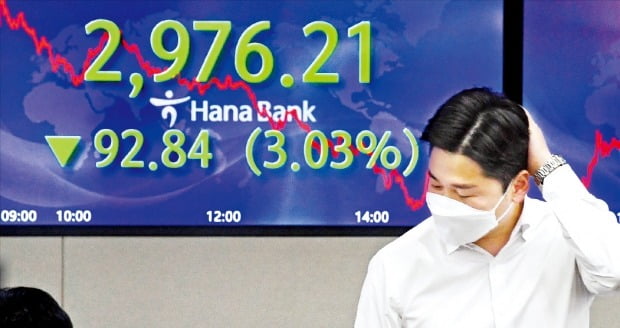 The 3000 line of the KOSPI index collapsed. The KOSPI index plunged 3.03% on the 29th and ended at 2976.21. Individuals continued to buy net, but it was not enough to receive sales from foreigners and institutions. The photo shows a dealing room at Hana Bank’s headquarters in Myeong-dong, Seoul on the same day. Reporter Eun-gu Kang [email protected] “/>
The 3000 line of the KOSPI index collapsed. The KOSPI index plunged 3.03% on the 29th and ended at 2976.21. Individuals continued to buy net, but it was not enough to receive sales from foreigners and institutions. The photo shows a dealing room at Hana Bank’s headquarters in Myeong-dong, Seoul on the same day. Reporter Eun-gu Kang [email protected] “/>
The 3000 line of the KOSPI index collapsed. The KOSPI index plunged 3.03% on the 29th and ended at 2976.21. Individuals continued to buy net, but it was not enough to receive sales from foreigners and institutions. The photo shows a dealing room at Hana Bank’s headquarters in Myeong-dong, Seoul on the same day. Reporter Eun-gu Kang [email protected]
Before the market opened on the 29th, individuals expected stock prices to rise. This is because the pattern of rebounding the next day after a sharp decline from the end of last year was repeated. The US stock market also rose the night before. The market opened at 9 am. It seemed to go as expected. It started trading at a 1% increase from the previous day. When the stock price rose, foreigners started selling. Individuals took it and blocked it with a drop of 1% until the morning. In the afternoon, foreigners gave out more. The KOSPI index fell to the 2% range. At 3:20, 10 minutes before the closing of the market, a rare scene unfolded. As soon as they started to receive simultaneous quotes, a forecast came up in the trading system of securities companies that the KOSPI index would plunge by 6%, giving even 2900 lines. This is because foreigners poured out the sale at the last minute bid price. The amount of net sales released by foreigners for 10 minutes, which is the time of the simultaneous offer, amounted to 448.1 billion won. Individuals and institutions quickly received the volume, but in the end it fell around 3%.

Selling foreign hedge funds
The KOSPI index fell 3.03% to close at 2976.21. It is the first time since October last year that it fell for four consecutive days.
The characteristic of the decline on this day is that most stocks declined regardless of market cap and industry. According to the Korea Exchange, out of 912 stocks in the securities market, only 66 stocks closed up. Among the top 50 stocks in the market cap, only three (SK Innovation, Korea Zinc, and KT) are.
Experts pointed to selling foreign hedge funds as the cause of the stock price decline. Foreigners net sold 5,886.4 billion won worth of stocks in the domestic stock market this week. It is explained that they lowered the market by realizing profits across all domestic stock markets. Seo Sang-young, a researcher at Kiwoom Securities, said, “As global hedge funds rapidly reduced their share of stocks, the domestic stock market was also swept away.” It is said that investor sentiment worsened when US hedge funds, which suffered huge losses from GameStop, started selling their assets. Shin Jin-ho, CEO of Midas Asset Management, also explained, “As hedge funds around the world reduced the share of stocks in the face of a game stop situation, emerging countries including Korea became the target of disposition.”
How far will it fall
Considering the nature of the correction, there are many prospects that this decline could fall to the 2800 line, which has a 60-day moving average line, which shows a medium-term trend. The reason for not expecting a large decline is that the important factors that have led the bull market have not changed significantly. Kim Seung-hyun, head of the research center at Yuanta Securities, said, “Considering that the aftermath of the novel coronavirus infection (Corona 19) was fully reflected in the second quarter of last year, the indicators revealed throughout the first quarter of this year are highly likely to be positive.” “This adjustment will continue throughout the first quarter. It will not be able to break the upward trend.”
Some analysts say that the stock market’s valuation (share price compared to earnings) has improved as the performance of major companies and economic indicators revealed through the earnings season are positive. The fact that customer deposits have recovered to KRW 70 trillion is another reason that the adjustment is unlikely.
However, an analyst who asked for anonymity said, “Because the market trend tends to exceed expectations once it is formed, the 2500 and 2600 lines should be kept in mind.”
It is clear that the market atmosphere has changed
The change in the market atmosphere was cited as a boundary factor. It is explained that the market, which has deteriorated investment sentiment after one adjustment, will rise by confirming earnings and gradually raising the outlook, rather than creating a strong bull market as before. Kyobo Securities Center Director Kim Hyung-ryul said, “This adjustment is a process in which the concentration of risky assets from a short-term surge is resolved. Even if the bullish market continues, it will rise and fall at the historical peak rather than a sharp rise at the beginning of the year.”
Investors should also be aware of the increase in volatility. It is advice to increase the proportion of cash. Center Director Seung-Hyun Kim said, “As individuals are less capable of responding to volatility markets, enhancing the stability of the portfolio is a top priority.” It is argued that rather than trying to rush to’ride the water’, it is necessary to endure the market decline and wait for the timing to buy a low price.
Reporter Jeon Beomjin/Go Yoonsang/Yang Byunghoon [email protected]
